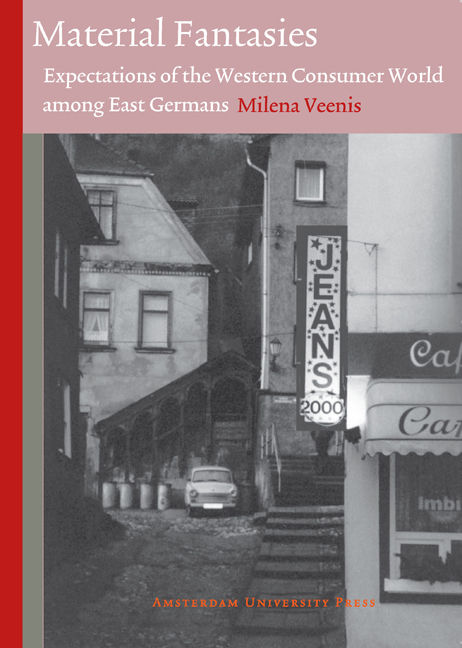Book contents
- Frontmatter
- Preface
- Contents
- Introduction
- Chapter 1 Fieldwork
- Chapter 2 Germany 1945: A Country in Ruins
- Chapter 3 The GDR: Future Promises
- Chapter 4 Material Realizations
- Chapter 5 The East German Dictatorship
- Chapter 6 Silenced Pasts
- Chapter 7 Western Promise
- Chapter 8 Shattered Illusions
- Conclusion
- Notes
- Bibliography
- Index
- Foundation for the History of Technology & Amsterdam University Press Technology and European History Series Ruth Oldenziel and Johan Schot (Eindhoven University of Technology): Series Editors
- Frontmatter
- Preface
- Contents
- Introduction
- Chapter 1 Fieldwork
- Chapter 2 Germany 1945: A Country in Ruins
- Chapter 3 The GDR: Future Promises
- Chapter 4 Material Realizations
- Chapter 5 The East German Dictatorship
- Chapter 6 Silenced Pasts
- Chapter 7 Western Promise
- Chapter 8 Shattered Illusions
- Conclusion
- Notes
- Bibliography
- Index
- Foundation for the History of Technology & Amsterdam University Press Technology and European History Series Ruth Oldenziel and Johan Schot (Eindhoven University of Technology): Series Editors
Summary
In 1994, the former socialist part of Germany, the German Democratic Republic (GDR), was probably one of the most fascinating places for an anthropologist to conduct research. Five years earlier, the Fall of the Berlin Wall had initiated the collapse of the socialist regime in Eastern Germany and the start of German reunification. Although heartily welcomed, this prompted the complete breakdown of East German society and the fast disintegration of all existing material, social, and conceptual standards. The ensuing turmoil could be seen, heard, and felt throughout the country. The general atmosphere was tense, and conversations on the most mundane topics could suddenly derail – ostensibly for no reason. Whereas anthropologists have generally come to accept that a society's social and cultural structures are not fixed but rather constructed, it was a shock to witness the panic and pain this confrontation caused in everyday life. People were frantically searching for new safeguards.
Since then much has changed – not just the material, social, and psychological make-up of the former socialist society, but also the way it is remembered. Initially, the painful breakdown of everything trusted and secure caused people to experience any criticism of their history as extraordinarily hurtful, but as time passed, people's memories on the GDR have grown more differentiated. In 1994, longing and nostalgia for the past, anger and denial with regard to criticizing it were common reactions to the complete reshuffling and widespread critique of former East Germans’ existence. Barely twenty year later, these responses have made way for a more nuanced and critical perspective on the GDR. This shift is clearly illustrated in cinematic form by two films about the GDR that received wide acclaim also outside Germany: Goodbye Lenin (2003) and Das Leben der Anderen (The Lives of Others, 2007). Although not denying or ignoring the dictatorial aspects of the GDR, the former film excels in its endearing, somewhat nostalgic depiction of the socialist past, whereas the latter conveys a far darker mood. Goodbye Lenin's main message is roughly: “life under socialism may have been cramped, and we may not have had much, but what we had was comfy and cozy,” while The Lives of Others reveals the almost unperceivable corruption of human relationships under socialist dictatorship. From humoristic-nostalgic and tenderly ironic, to gloomy and (self)critical: the two films represent the sequence of collective memories of the GDR in a nutshell.
- Type
- Chapter
- Information
- Material FantasiesExpectations of the Western Consumer World among East Germans, pp. 5 - 8Publisher: Amsterdam University PressPrint publication year: 2012



